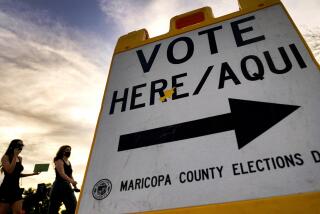Split Court Lets Easing of Visas for Leftists Stand
WASHINGTON â The Supreme Court, already showing signs that it cannot decide the most difficult cases without a ninth justice, said Monday that it had deadlocked on the question of whether the State Department may deny visas to foreign political activists who want to visit the United States.
The action leaves in place a lower court order that the Reagan Administration must give a court more evidence before it denies visas to leftist activists scheduled to make speeches or attend anti-nuclear rallies in the United States.
The high court issued a one-sentence order saying that âan equally divided courtâ would not issue a ruling in Reagan vs. Abourezk, 86-656, one of the most widely watched cases of this term. The justices had heard arguments on the case on Oct. 5, the first day of their fall session.
Only Six Justices Vote
The court said that it had split 3 to 3 with Justices Harry F. Blackmun and Antonin Scalia not voting. One of Blackmunâs former clerks was a lawyer in the case, and Scalia had sat on the Washington appeals court that heard the case.
Meanwhile, for the third week in a row, the eight justices ignored appeals on several significant national issues, such as whether the government may require its employees to take drug tests. Instead, the court said it would hear arguments on less significant procedural cases, such as whether a lawyer who makes a clerical error in a appeal may seek to correct the mistake in a higher court.
The court, without a ninth justice since Lewis F. Powell Jr. retired, is left with four generally conservative justices and four who are generally liberal. The justices do not explain why they decide to hear one appeal and not another.
So far, the court has refused to hear an appeal testing the constitutionality of appointing independent counsels in government ethics cases, delayed action on drug-testing cases and refused to hear a major dispute over whether a biographer of reclusive author J. D. Salinger may quote from unpublished letters housed in research libraries.
To Hear Dozens of Cases
The court has agreed to hear several dozen cases, including disputes over the distribution of attorneysâ fees, the selection of a court site in cases concerning both federal and state laws and whether creditors of a deceased man are denied their constitutional rights by a state law that requires them to post their claims within two months of his death.
The court on Monday recessed until the first week in November, when it will consider cases on state abortion regulations and the death penalty for minors--two issues that also could result in a deadlocks.
Among the 101 appeals acted on Monday, the justices agreed to decide one potentially significant question: May states require professional fund raisers for charities to disclose how much of the money they collect actually goes to a charity? A North Carolina law would force solicitors to issue an annual report on their activities and to tell potential contributors if they kept more than 20% of the contributions.
A federal appeals court struck down the law as a violation of the free speech rights of charities. The state appealed and the high court agreed to hear the case (Riley vs. National Federation of the Blind of North Carolina, 87-328).
In other actions, the court:
--Agreed to decide whether contractors who work for the federal government are immune from suits. The case (West vs. Atkins, 87-5096) involves a prison doctor who refused to operate on an injured prisoner. An appeals court ruled that, because the doctor worked under contract to the federal government, he could not be sued. Lawyers for the inmate said that the doctor should be subject to suits like any other physician.
--Refused to come to the aid of G. D. Searle & Co., which has been required to divulge how much money it has set aside to cover liability suits. The company is facing nearly 500 lawsuits involving its interuterine contraceptive device, and its lawyers argued that such a disclosure gives an unfair advantage to the plaintiffs (G. D. Searle vs. Simon, 87-326).
More to Read
Sign up for Essential California
The most important California stories and recommendations in your inbox every morning.
You may occasionally receive promotional content from the Los Angeles Times.











